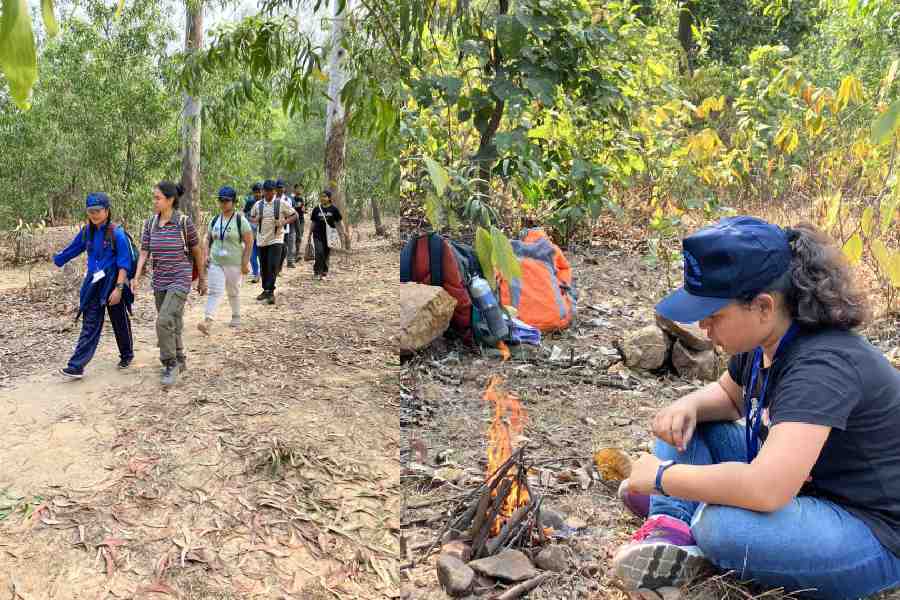Nature camps are not jolly outings but character-building exercises


The term “forest bathing” is fairly new, but the practice of it can be traced to Japan, where they call it shinrin-yoku. Shinrin means forest, and yoku means bath in Japanese. The tradition encourages people to immerse themselves in nature.
According to scientific studies, exposure to nature improves emotional health, especially of children. In the book Last Child in the Woods, Richard Louv writes, “Time in nature can help children learn to build confidence, teach them to calm themselves, improve focus, decrease symptoms of attention-deficit disorder, improve creativity...” Louv is an American journalist and writer. In India, way back in the early 20th century, Rabindranath Tagore implemented the outdoor learning approach in Visva-Bharati.
Most modern schools, especially in the crowded urban pockets, cannot offer the luxury of learning in the lap of nature. But several NGOs have been trying to build human-nature connections among school and college students. South Calcutta Trekkers Association (SCTA) is one such organisation.
The SCTA has been organising adventure and nature study camps for students since 1987. “Camping in the wilderness is an excellent medium for interaction between man and nature... adventure in natural surroundings helps a child grow into a complete human being,” says Basudeb Datta, who is vice-president of the association. Every winter, school students enrolled with the SCTA go camping in the hill tracts of West Bengal, Jharkhand and Odisha.
Their idea is not only to expose the children to the great outdoors, but also to induce the spirit of adventure in their minds. In the wilderness they learn to identify trees, herbs, birds, insects, butterflies and get trained in adventure activities such as trekking, crossing rivulets and streams, and climbing boulders. According to Datta, they learn the basic survival strategies of human beings — preparing makeshift camps, lighting fires and cooking food in the wild. They also learn how to trail forest animals, use a compass to determine direction and read maps. He adds, “The skills they learn in the wilderness help them navigate problems in real life with greater patience.”
Arka Sengupta, a Class VI student at Haryana Vidya Mandir in Salt Lake, Calcutta, attended the SCTA adventure and nature study camps in 2019 and 2022. He says, “Last year, our camp was held at Susunia in Bankura district.” In the day out programme, we had to trek a kilometre from our base camp to reach a hill; we stayed there the whole day. The hill was surrounded by a forest.” Each camper had to collect wood from the forest. They learnt to make fire.
They would return to the base camp at 5pm. At night, campers did some star gazing and listened to the calls of crickets, nocturnal birds and animals. Says Arka, “‘We had to fix our tents using polythene sheets and rope. Then we sang songs, ate fried rice and egg. I made new friends.”
Asmita Mondal, who is a student at National Institute of Fashion Technology at Salt Lake, lives in Haltu in south Calcutta. Since 2018, she has been attending camps in Chimney in Kurseong district and Rishyap in Darjeeling district as well as in Purulia. This summer, she participated in a nature camp as a guide. She says, “This time, apart from the usual activities, we also visited a village.”
Shyamal Acharya, founder member of Kamarhati Trekkers Association, says, “These camps also inculcate a sense of discipline. Many of the campers turn into trekkers and mountaineers later in life.” Agrees Deepali Sinha, now 77 years old and one of the pioneering women mountaineers of India who used to organise such camps. She says, “The camping experience helps children relax, and also learn discipline, time management and fellow feeling.”
Dr Ashok Ghosh is 71 years old and is based at Sovabazar in north Calcutta. The doctor has been participating in the adventure and nature study camps of the SCTA as an instructor since 1989. He says, “I help students learn about plants, the basics of identifying and watching birds and insects in the forest. We encourage them to gaze at the sky and identify the pole star…”
Indranil Sarkar, 50, a businessman, has also been associated with the SCTA since 1992. He teaches how to read a map and navigate in the forest with a compass. He says, “During the day, students get hands-on learning to move around the jungle up to five kilometres with a map and compass.”
Jetri Das Bhattacharya was nine when she started camping. She is 35 years old now. Inspired by her camping experience, she did a bachelor’s in travel and tourism management. She works as a corporate sales manager at a hotel, but has not given up on camping. These days, she participates as a guide. She says, “Students learn to become self-reliant at camps. Life without modern gadgets, fast food, shopping malls give them ample opportunity to fall in love with nature and grow up into responsible adults.”